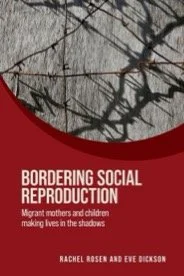By Rachel Rosen and Eve Dickson
Bordering social reproduction explores what happens when migrants subject to policies that seek to deny them the means of life nonetheless endeavour to make and sustain meaningful lives. The book provides rich ethnographic insights into the complexities of the everyday lives of mothers and children with insecure migration status who are subject to the United Kingdom’s ‘no recourse to public funds’ policy. This immigration condition prohibits access to housing assistance and most welfare benefits even for the most destitute. Developing innovative theorisations of welfare bordering, this book shows how enforced destitution and debt work alongside detention and deportation as tripartite exclusionary technologies of the racial state. Bordering social reproduction advances the novel concept of weathering to comprehend mothers’ and children’s life-making practices under duress – arguing that these are neither acts of heroic resilience nor solely symptomatic of lives rendered disposable, but indications of the fragilities of repressive migration regimes and, on occasion, the refusal to accept their terms of existence. This engaging book invites us to think carefully about the relationship between welfare states and border regimes, and how we might contest their intertwinement. Making incisive interventions into theoretical discussions around social reproduction, bordering and childhood, the book offers critical contributions in response to contemporary debates about the nature of welfare support and migration.
Manchester, UK: Manchester University Press, 2025.






